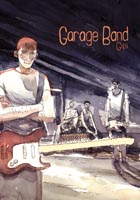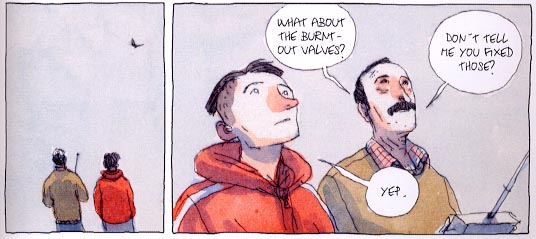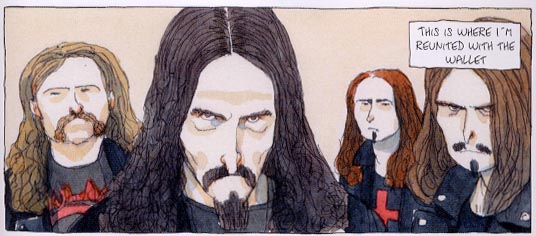 By Gipi
By Gipi
128 pages, color
Published by First Second Books
Up until now, the only works by Gipi that I’d seen in English were Wish You Were Here and They Found The Car, stories of people with dubious morals in noir settings. The idea of a book by Gipi not only being in full color but involving young adults starting a band seemed rather alien to me. Was this really the same Gipi? And would I be able to get the same level of enjoyment out of Garage Band? Well, as it turned out, the answer was yes and no.
Guiliano’s father is letting him and his friends use an empty garage as rehearsal space for their new rock band. Of course, having space and instruments doesn’t make you an actual band. For that it takes writing songs, practicing, and if you’re really lucky some performances or even a recording contract. Funny, though, how “getting along” never seems to be on the list of requirements to create a band. The four men in the band are learning the hard way that it might just be the most important part of all.

Garage Band is in many ways more of a character study than a book about forming a band. That’s the nominal idea, certainly, but aside from being what unites our four leads it never seems to be more than a loose springboard for something more. The problem is, I don’t think it entirely succeeds on that level. Most of the characters get drowned out in favor of Alex, whose obsession with Nazi regalia and general loud mouth (even as he defers to his mother) makes him the most visible. Some characters, like Guiliano and Stefano, get little glimpses of their greater character before they fall to the wayside, and poor Alberto never seems to get the spotlight at all. With all that in mind, what’s left is the actual plot, which feels a little thin in places. Things don’t really get rolling until almost two thirds of the way through when they decide to steal equipment that they need—but by that point it’s almost over. It’s frustrating because the last third of the book is really quite strong and makes me genuinely want to see more, and makes me wish that the entire book was that enjoyable.
The art in Garage Band, on the other hand, is strong the whole way through. I love how he draws Guiliano’s sheepish face, for instance, or Alberto hanging out with his father. There’s a good sense of body language on display here; each of their characters radiate their personality, be it confidence, contriteness, or arrogance. It’s my favorite part of the book, and the supplemental material at the end showing Gipi’s early character studies show just how much thought and effort went into creating the four members of the band. There are some similarities that hold true to just about all of the characters—tall lanky bodies and pointy noses—but Gipi still does a nice job of drawing people in general. Seeing a color wash over the art was new to me when it came to Gipi’s work, but it’s an attractive finished product.

Aside from one scene towards the very end of the book, Garage Band really isn’t about the music industry. It’s not even really that much about creating music. It’s more about friends and what they’re willing to do for each other. On some level the book takes too long to really get going in order to completely succeed, but the pieces that are there are nice. I’d actually really want to see a sequel down the line because now that things are put together and moving forward (instead of taking far too long on set-up) it’s got a lot of potential. It may not have contained the punch that Gipi’s noir-themed books had, but it was still a pleasant way to spend an afternoon.
Purchase Links: Amazon.com
